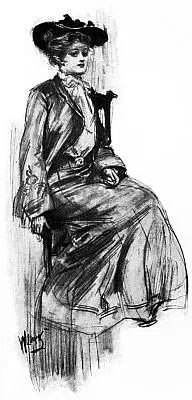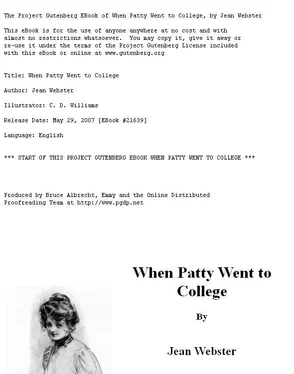Jean Webster - When Patty Went to College
Здесь есть возможность читать онлайн «Jean Webster - When Patty Went to College» весь текст электронной книги совершенно бесплатно (целиком полную версию без сокращений). В некоторых случаях можно слушать аудио, скачать через торрент в формате fb2 и присутствует краткое содержание. Год выпуска: 2007, Жанр: Классическая проза, на английском языке. Описание произведения, (предисловие) а так же отзывы посетителей доступны на портале библиотеки ЛибКат.
- Название:When Patty Went to College
- Автор:
- Жанр:
- Год:2007
- ISBN:нет данных
- Рейтинг книги:4 / 5. Голосов: 1
-
Избранное:Добавить в избранное
- Отзывы:
-
Ваша оценка:
- 80
- 1
- 2
- 3
- 4
- 5
When Patty Went to College: краткое содержание, описание и аннотация
Предлагаем к чтению аннотацию, описание, краткое содержание или предисловие (зависит от того, что написал сам автор книги «When Patty Went to College»). Если вы не нашли необходимую информацию о книге — напишите в комментариях, мы постараемся отыскать её.
When Patty Went to College — читать онлайн бесплатно полную книгу (весь текст) целиком
Ниже представлен текст книги, разбитый по страницам. Система сохранения места последней прочитанной страницы, позволяет с удобством читать онлайн бесплатно книгу «When Patty Went to College», без необходимости каждый раз заново искать на чём Вы остановились. Поставьте закладку, и сможете в любой момент перейти на страницу, на которой закончили чтение.
Интервал:
Закладка:
Patty brought out this astounding request in the most matter-of-fact way possible, and the corners of Miss Prescott's mouth twitched as she asked: "Of whom are you speaking?"
"Olivia Copeland."
Miss Prescott's mouth grew firm, and she looked like the instructor in mathematics again.
"Miss Copeland did absolutely nothing on her examination, Miss Wyatt, and what little she has recited during the year does not betoken any unusual ability. I am sorry, but it would be impossible."
"But, Miss Prescott," Patty expostulated, "the girl has worked under such peculiar disadvantages. She's an American, but she lives abroad, and all our ways are new to her. She has never been to school a day in her life. Her father prepared her for college, and, of course, not in the same way that the other girls have been prepared. She is shy, and not being used to reciting in a class, she doesn't know how to show off. I am sure, Miss Prescott, that if you would take her and examine her yourself, you would find that she understands the work—that is, if you would let her get over being afraid of you first. I know you're busy, and it's asking a good deal," Patty finished apologetically.
"It is not that, Miss Wyatt, for of course I do not wish to mark any student unjustly; but I cannot help feeling that you have overestimated Miss Copeland's ability. She has really had a chance to show what is in her, and if she has failed in as many courses as you say—The college, you know, must keep up the standard of its work, and in questions like this it is not always possible to consider the individual."
Patty felt that she was being dismissed, and she groped about wildly for a new plea. Her eye caught a framed picture of the old monastery of Amalfi hanging over the bookcase.
"Perhaps you've lived in Italy?" she asked.
Miss Prescott started slightly. "No," she said; "but I've spent some time there."
 Olivia Copeland
Olivia Copeland
"That picture of Amalfi, up there, made me think of it. Olivia Copeland, you know, lives near there, at Sorrento."
A gleam of interest flashed into Miss Prescott's eye.
"That's how I first came to notice her," continued Patty; "but she didn't interest me so much until I talked to her. It seems that her father is an artist, and she was born in Italy, and has only visited America once when she was a little girl. Her mother is dead, and she and her father live in an old villa on that road along the coast leading to Sorrento. She has never had any girl friends; just her father's friends—artists and diplomats and people like that. She speaks Italian, and she knows all about Italian art and politics and the church and the agrarian laws and how the people are taxed; and all the peasants around Sorrento are her friends. She is so homesick that she nearly dies, and the only person here that she can talk to about the things she is interested in is the peanut man down-town.
"The girls she rooms with are just nice exuberant American girls, and are interested in golf and basket-ball and Welsh rabbit and Richard Harding Davis stories and Gibson pictures—and she never even heard of any of them until four months ago. She has a water-color sketch of the villa, that her father did. It's white stucco, you know, with terraces and marble balustrades and broken statues, and a grove of ilex-trees with a fountain in the center. Just think of belonging to a place like that, Miss Prescott, and then being suddenly plunged into a place like this without any friends or any one who even knows about the things you know—think how lonely you would be!"
Patty leaned forward with flushed cheeks, carried away by her own eloquence. "You know what Italy's like. It's a sort of disease. If you once get fond of it you'll never forget it, and you just can't be happy till you get back. And with Olivia it's her home, besides. She's never known anything else. And it's hard at first to keep your mind on mathematics when you're dreaming all the time of ilex groves and fountains and nightingales and—and things like that."
She finished lamely, for Miss Prescott suddenly leaned back in the shadow, and it seemed to Patty that her face had grown pale and the hand that held the magazine trembled.
Patty flushed uncomfortably and tried to think what she had said. She was always saying things that hurt people's feelings without meaning to. Suddenly that old story from her freshman year flashed into her mind. He had been an artist and had lived in Italy and had died of Roman fever; and Miss Prescott had gone to Germany to study mathematics, and had never cared for anything else since. It sounded rather made up, but it might be true. Had she stumbled on a forbidden subject? she wondered miserably. She had, of course; it was just her way.
The silence was becoming unbearable; she struggled to think of something to say, but nothing came, and she rose abruptly.
"I'm sorry to have taken so much of your time, Miss Prescott. I hope I haven't bored you. Good night."
Miss Prescott rose and took Patty's hand. "Good night, my dear, and thank you for coming to me. I am glad to know of Olivia Copeland. I will see what can be done about her geometry, and I shall be glad, besides, to know her as—as a friend; for I, too, once cared for Italy."
Patty closed the door softly and tiptoed home through the dim corridors.
"Did you bring the matches?" called a sleepy voice from Priscilla's bedroom.
Patty started. "Oh, the matches!" she laughed. "No; I forgot them."
"I never knew you to accomplish anything yet that you started out to do, Patty Wyatt."
"I've accomplished something to-night, just the same," Patty retorted, with a little note of triumph in her voice; "but I haven't an idea how I happened to do it," she added frankly to herself.
And she went to bed and fell asleep, quite unaware of how much she had accomplished; for unconsciously she had laid the foundation of a friendship which was to make happy the future of a lonely freshman and an equally lonely instructor.
XI
"Local Color"

HE third senior table had discovered a new amusement with which to enlighten the tedium of waiting while Maggie was in the kitchen foraging for food. The game was called "local color," in honor of Patty Wyatt's famous definition in English class, "Local color is that which makes a lie seem truthful." The object of the game was to see who could tell the biggest lie without being found out; and the one rule required that the victims be disillusionized before they left the table.
Patty was the instigator, the champion player, and the final victim of the game. Baron Münchhausen himself would have blushed at some of her creations, and her stories were told with such an air of ingenuous honesty that the most outrageous among them obtained credence.
The game in its original conception may have been innocent enough, but the rule was not always as carefully observed as it should have been, and the most unaccountable scandals began to float about college. The president of "Christians" had been called up for cutting chapel. The shark of the class had flunked her ethics, and even failed to get through on the "re." Cathy Fair was an own cousin of Professor Hitchcock's, and called him "Tommy" to his face. These, and far worse, were becoming public property; and even personal fabrications in regard to the faculty, intended solely for undergraduate consumption, were reaching the ears of the faculty themselves.
Читать дальшеИнтервал:
Закладка:
Похожие книги на «When Patty Went to College»
Представляем Вашему вниманию похожие книги на «When Patty Went to College» списком для выбора. Мы отобрали схожую по названию и смыслу литературу в надежде предоставить читателям больше вариантов отыскать новые, интересные, ещё непрочитанные произведения.
Обсуждение, отзывы о книге «When Patty Went to College» и просто собственные мнения читателей. Оставьте ваши комментарии, напишите, что Вы думаете о произведении, его смысле или главных героях. Укажите что конкретно понравилось, а что нет, и почему Вы так считаете.












